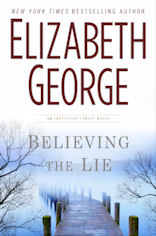|
|
|
|||
|
REVIEWS: BELIEVING THE
The Seattle Times
"Believing the Lie" is George's latest, and it stars the author's most famous figure, aristocratic Detective Inspector Thomas Lynley. George typically allows multiple plot lines to radiate from a central event before slowly connecting. Here, the event is Lynley's investigation into the drowning death of Ian Cresswell in a lake in Cumbria, in northwest England. Cresswell was part of the extended, wealthy Fairclough family. The drowning appears accidental, and Lynley's longtime colleague, forensics expert Simon St. James, sees nothing to the contrary. Meanwhile, Zed Benjamin, a tabloid writer, is sniffing around. Teetering on the verge of losing his job, Benjamin needs a big story to impress his boss, and he suspects a death in the Fairclough family might serve. Who could benefit from Cresswell's death? That family! Cresswell's cousin Nicholas is a recovering addict, married to the glamorous Alatea. Mignon and Manette are Nicholas' sisters, one nice and one nasty. Meanwhile, Cresswell's ex-wife Niamh is a mother from hell trying to desert her troubled kids. Then there's Kaveh Mehran, the man for whom Ian Cresswell scandalously left Niamh. And the family elders (Nicholas' parents, who are Cresswell's aunt and uncle) have their own peculiarities. Those are just some of the people and relationships in this complex book. You'll need a score card. Parenting and the lack of it are recurring themes. Niamh and Ian's children are frantic to escape their toxic mother. As Niamh relinquishes responsibility, Kaveh faces the prospect of caring for them, even as his own impending heterosexual marriage looms. And then there's the question of becoming parents. Two couples — Simon and his wife, Deborah, and Alatea and Nicholas — are pursuing surrogacy, although each of the four has some ambivalence about the process. Adoption is discussed but never explored. Meanwhile, Lynley's working-class police colleague Barbara Havers is in London, doing research for her boss. She's got her own relationship issues — although she's also having some really good hair days. Lynley stays with the case, sensing something more behind the apparently simple drowning accident. As he does, he uncovers a wealth of Fairclough family secrets — including a big one at the end that gives the book's title a bittersweet twist. I've remarked before that George's jumbo-sized books could make handy offensive weapons, and "Believing the Lie" doesn't disappoint in that regard. Don't be discouraged by its size — there's no wasted motion or extraneous fat. However, to my mind there is one misstep. That's Zev's Jewish mother, who is obsessed to the point of lunacy with finding a mate for her son. Oddly for such a subtle writer, George paints this woman as a cartoonish yenta — a busybody — whose character never rings true. (Full disclosure: I'm a nice Jewish boy.) On the other hand — one misstep in a 600-page book? We should all be so lucky. Adam Woog's column on crime and mystery fiction appears on the second Sunday of the month in The Seattle Times. |
||||
| Site Copyright 2020 Elizabeth George Site Designed and Maintained by Dovetail Studio |
||||

 Whidbey
Island resident Elizabeth George is a superstar of the crime-fiction
world, British Inspector Division. Deservedly so: Her tales always
provide nuanced character studies and insights into social issues
along with their intricate mysteries.
Whidbey
Island resident Elizabeth George is a superstar of the crime-fiction
world, British Inspector Division. Deservedly so: Her tales always
provide nuanced character studies and insights into social issues
along with their intricate mysteries.